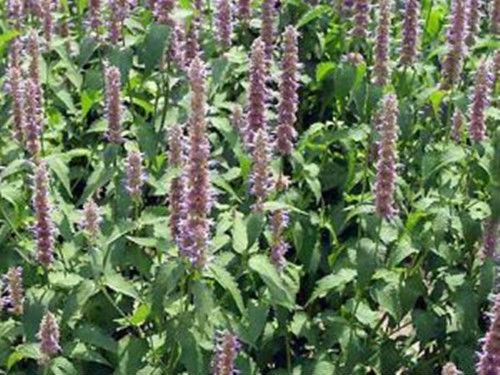 Achyranthes bidentata (Huai Niu Xi) has been an important herb in the pharmacopeia of Traditional Chinese Medicine for centuries. It is frequently used in Yang tonic formulations for a variety of health benefits. Such benefits include strengthening tendons and bones, alleviating lower back and knee soreness, and reducing pain in joints and muscles. In modern terms, Achyranthes is helpful against the pain and stiffness that we now call arthritis. The diversity of uses for Achyranthes against joint and muscle pain has attracted interest from scientists seeking to explain how well this herb works and by what mechanisms it does so. Studies in the mid-twentieth century began with determining its chemical constituents. More recent research has explored how the more active of these constituents work against pain, particularly against pain associated with joints and muscles.
Achyranthes bidentata (Huai Niu Xi) has been an important herb in the pharmacopeia of Traditional Chinese Medicine for centuries. It is frequently used in Yang tonic formulations for a variety of health benefits. Such benefits include strengthening tendons and bones, alleviating lower back and knee soreness, and reducing pain in joints and muscles. In modern terms, Achyranthes is helpful against the pain and stiffness that we now call arthritis. The diversity of uses for Achyranthes against joint and muscle pain has attracted interest from scientists seeking to explain how well this herb works and by what mechanisms it does so. Studies in the mid-twentieth century began with determining its chemical constituents. More recent research has explored how the more active of these constituents work against pain, particularly against pain associated with joints and muscles.
Natural Products of Achyranthes
Dozens of substances have been identified from Achyranthes roots. The most notable of these are classified as a type of natural products called saponins. This class of compounds is found in several of the most important medicinal herbs. Besides Achyranthes, examples include such well-known herbs as ginseng, astragalus, licorice root and black cohosh Saponins get their name from their soap-like quality of producing a foam when dissolved in water. Indeed, some saponin-producing plants, such as yucca, were traditionally used as natural soaps. These herbs still appear as ingredients in skin cleansers and natural soaps. One of the key features of saponins is that they have a fat-soluble portion that enables their absorption into skin. This feature underlies the importance of saponin-producing herbs in skin care products. Although the saponins of Achyranthes are similar to those of other medicinal herbs, they are unique in their details. These chemical details trigger the specific activities of Achyranthes against joint and muscle pain.
Achyranthes in Modern Science
Some of the earliest research on Achyranthes extracts, at the Nanjin University of Traditional Chinese Medicine, confirmed the activity of this herb as an analgesic and anti-inflammatory. More recent studies explain this activity by the ability of Achyranthes saponins to inhibit a type of enzyme called lipoxygenase. Inhibition of this enzyme helps prevent the accumulation of inflammatory hormones that derive from the oxidation of cellular fats. Some the latest research on Achyranthes root extract has also shown a remarkable activity against the excessive buildup of a type of white blood cell. One of the consequences of this buildup leads to rheumatoid arthritis, which is stopped by the activity of Achyranthes saponins. Achyranthes root saponins also have a beneficial effect on bone growth by promoting the formation of new cells in bone marrow. In addition, laboratory studies show the action of saponin-containing extracts for preventing postmenopausal osteoporosis.
Achyranthes Formulas for Joint Health
This herb is clearly valuable in any herbal formula for alleviating pain and inflammation in joints and muscles. Such traditional uses continue to be confirmed by modern scientific research. Ideally, herbal formulas that contain Achyranthres also offer additional herbs that provide support for healthy joints, muscles and skin. The Muscle & Joint Pain Relief Gel by Jadience Herbal Formulas is one such skin care product. It is a mixture of herbal ingredients that is designed to relax sore and tight muscles, relieve pain, and reduce swelling and inflammation. Achyranthes and other herbs in this formula also strengthen muscles and joints. In additioin, Jadience has Muscle & Joint Therapeutic Cream – Extra Strength for immediate help with more acute pain and inflammation when needed. Interested in trying Jadience Herbal Formulas samples? Click here


